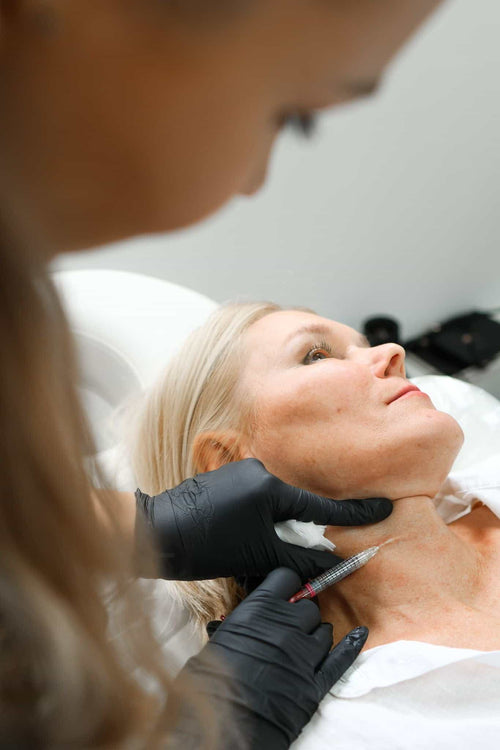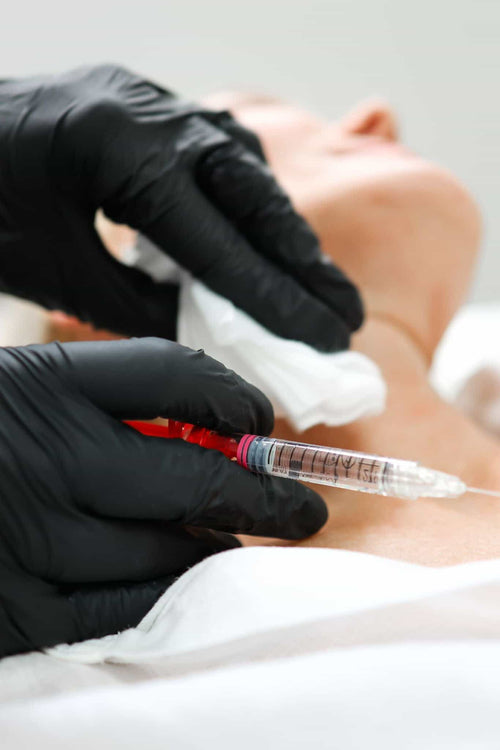Arrange Your Dermal Filler Consultation with Dr. Laura Geige
Medical Conditions
Certain Skin Diseases
Medical conditions can influence a person’s suitability for lip fillers.
Active skin infections, such as cold sores or acne, near the injection site are contraindications. These infections could spread and complicate healing.
Individuals with bleeding disorders or taking blood thinners, like aspirin or warfarin, are at increased risk of bruising and bleeding after injections. This can lead to uneven filler distribution and potential complications.
Certain autoimmune diseases, like lupus or scleroderma, can affect the body’s response to fillers, potentially causing inflammation or rejection.
Individuals with allergies to hyaluronic acid, lidocaine (often included in fillers), or other components of lip fillers should avoid treatment to prevent allergic reactions.
Skin diseases that impact collagen production or skin integrity can also make someone a poor candidate.
Examples include severe rosacea, psoriasis, or eczema, which may hinder proper filler absorption and integration, leading to unpredictable results.
Pregnancy and breastfeeding are generally considered contraindications for lip fillers due to the potential unknown effects on both the mother and child. It’s best to consult a doctor about any risks associated with cosmetic procedures during these stages.
Anyone with concerns or underlying medical conditions should consult with a qualified dermatologist or plastic surgeon before undergoing lip filler treatments.
They can assess individual health factors, discuss potential risks and benefits, and determine the most appropriate course of action.
Blood Clotting Disorders
Blood clotting disorders can significantly impact a person’s candidacy for lip fillers. These disorders, which affect the body’s ability to form blood clots, increase the risk of excessive bleeding during and after the procedure.
One common blood clotting disorder is hemophilia. This genetic condition prevents the blood from clotting properly, leading to prolonged bleeding even from minor injuries. Individuals with hemophilia are generally considered unsuitable for lip fillers due to the heightened risk of severe bleeding complications.
Other clotting disorders like von Willebrand disease also pose a risk. Von Willebrand disease affects the platelets’ ability to stick together and form clots. While less severe than hemophilia, it can still result in increased bleeding during lip filler injections.
Furthermore, certain medications, such as anticoagulants (blood thinners), can interfere with blood clotting and make lip fillers unsafe. If a person is taking blood thinners, it’s crucial to consult with their doctor regarding the potential risks and benefits of undergoing lip filler treatment.
The decision of whether or not someone with a blood clotting disorder can safely receive lip fillers ultimately depends on several factors, including the severity of the disorder, their medical history, and the specific type of filler being used. A thorough medical evaluation by a qualified and experienced practitioner is essential to determine the safest course of action.
It’s important for individuals considering lip fillers to disclose any existing blood clotting disorders or medications they are taking to their practitioner. This information allows the practitioner to assess the risks and benefits and make an informed decision regarding their suitability for the procedure.
Secure Your Dermal Filler Appointment with Dr. Laura Geige
Pregnancy or Breastfeeding
Certain medical conditions can make individuals unsuitable candidates for lip fillers. For example, active herpes simplex virus (HSV) infections around the mouth can increase the risk of complications like infection or filler migration.
People with a history of keloid scarring or hypertrophic scarring should be cautious as fillers might exacerbate these conditions. Similarly, individuals taking blood thinners or medications that affect collagen synthesis may experience increased bleeding or impaired results.
Pregnancy and breastfeeding are also considerations. While there’s limited research on the specific effects of lip fillers during these periods, it’s generally recommended to avoid them due to potential risks to both mother and baby.
Finally, those with certain autoimmune diseases or allergies to hyaluronic acid (a common filler ingredient) should consult their doctor before considering lip fillers.
It’s crucial for individuals considering lip fillers to have a thorough consultation with a qualified medical professional who can assess their individual health history and determine if they are a suitable candidate for the procedure.
Medications and Substance Use

Anti-Inflammatory Drugs
Medications and substance use can significantly impact a person’s suitability for lip fillers.
**Anti-inflammatory drugs**, such as aspirin, ibuprofen (Advil), naproxen (Aleve), or blood thinners like warfarin (Coumadin), can increase the risk of bleeding and bruising. These side effects are particularly concerning during and after a procedure like lip augmentation, where injections are made into delicate tissue.
Individuals taking these medications may experience prolonged bleeding, delayed healing, or even complications like hematomas (blood clots).
It’s crucial to discuss your entire medication list, including over-the-counter drugs and supplements, with the administering physician before undergoing any cosmetic procedure involving injections.
They can assess the potential risks and advise on adjustments or temporary discontinuation of certain medications to ensure a safe and successful outcome.
Retinoids
Retinoids are vitamin A derivatives commonly used to treat acne, wrinkles, and other skin conditions.
Because retinoids increase cell turnover and can make the skin more sensitive, individuals using them may not be suitable candidates for lip fillers. Here’s why:
-
Increased Risk of Bruising: Retinoids thin the blood vessels, which increases the risk of bruising during and after the filler injection.
-
Skin Irritation: The combination of retinoid use and lip fillers can lead to inflammation, redness, or irritation at the injection site.
-
Altered Filler Distribution: Retinoids’ impact on cell turnover may affect how filler is absorbed and distributed in the lips.
It’s important for individuals considering lip fillers to discuss their retinoid use with a qualified medical professional. The doctor can assess their skin condition, medication history, and potential risks to determine if fillers are appropriate.
If you are currently using retinoids, your doctor may recommend temporarily discontinuing them before the procedure or adjusting the dosage. They will provide specific instructions tailored to your individual needs.
Alcohol Consumption
Determining who is not a good candidate for lip fillers requires careful consideration of various factors, including medical history, current medications and substance use.
Individuals with active skin infections or lesions in the area being treated should avoid lip fillers.
Here are some specific medications and substances that can pose risks or complications:
- Blood Thinners: Medications like warfarin (Coumadin) and aspirin can increase bleeding risk, leading to bruising, swelling, or even hematoma formation after lip filler injection.
- Anti-inflammatory Drugs: Nonsteroidal anti-inflammatory drugs (NSAIDs) like ibuprofen (Advil, Motrin) and naproxen (Aleve) can also thin the blood and elevate the risk of bleeding complications.
- Retinoids: These vitamin A derivatives, commonly used in acne treatment, can make the skin more sensitive and prone to irritation. It’s advisable to discontinue retinoid use a few weeks before and after lip filler injections.
- Alcohol: Excessive alcohol consumption can dehydrate the body and thin the blood, increasing bleeding risks associated with dermal fillers.
It is crucial to discuss all medications and supplements you are taking with your injector before undergoing lip filler treatment.
They will assess your individual risk factors and determine if any adjustments to your medication regimen or timing of the procedure are necessary for a safe and successful outcome.
Book a Dermal Filler Consultation with Dr. Laura Geige at It’s Me and You Clinic
Let me know if you have any other questions.

Lifestyle Factors**
Smoking
Lifestyle factors play a significant role in determining whether someone is a good candidate for lip fillers. Certain habits can impact the results and longevity of the treatment, as well as increase potential risks.
Smoking is one major lifestyle factor that can negatively affect lip filler outcomes. Nicotine constricts blood vessels, which can impair blood flow to the lips. This reduced circulation hinders the distribution of filler and slows down the healing process.
Smokers are more likely to experience complications such as:
-
Bruising and swelling:
Reduced blood flow increases the risk of bruising and prolonged swelling after the procedure.
-
Asymmetry:
Nicotine can affect muscle movement in the lips, potentially leading to uneven filler distribution.
-
Poor healing:
Smokers take longer to heal due to impaired circulation, which can compromise the filler’s longevity and increase the risk of infection.
-
Reduced results:
Filler may not be as effective in smokers because the constricted blood vessels hinder its absorption and distribution.
Additionally, smoking contributes to premature aging by damaging collagen and elastin fibers in the skin, which are essential for maintaining lip volume and shape. This can make it more challenging to achieve natural-looking results with fillers.
For individuals who smoke heavily, it’s generally advisable to quit several weeks before undergoing lip filler treatment. This will improve blood flow, enhance healing, and maximize the effectiveness of the procedure.
Sun Exposure
Lifestyle factors can play a significant role in how well someone responds to lip fillers and the longevity of the results.
Smoking significantly impairs collagen production, which is essential for skin elasticity and plumpness. This can lead to uneven filler distribution, reduced effectiveness, and faster breakdown of the filler material.
Excessive sun exposure damages collagen fibers, weakening the skin and increasing the risk of premature aging. Sun-damaged lips may not retain fillers as well and could experience more wrinkling or thinning over time.
Alcohol consumption can dehydrate the body, affecting the hydration levels of the skin, including the lips. Dehydrated skin absorbs moisture poorly, potentially impacting the smooth integration and longevity of fillers.
Certain medications, such as blood thinners, can increase bleeding during and after the procedure, making it more difficult to achieve precise results and increasing the risk of bruising.
A healthy lifestyle that includes a balanced diet, regular exercise, adequate hydration, and proper sun protection can contribute to healthier skin and potentially better outcomes with lip fillers.
Individuals who are engaged in activities that involve repetitive mouth movements, such as playing wind instruments or speaking frequently, may experience faster filler breakdown due to the increased stress on the injected area.
People with certain medical conditions, such as autoimmune disorders, keloid scarring, or allergies to specific substances, may not be suitable candidates for lip fillers.
Dejour Magazine Alabama Sig Delt En Bloch Hotels Cotswold House Hotel Create Cocktails at Home
- Vista Edge Vape For Medical Cannabis: Is It A Good Option? - June 2, 2025
- Retinol Peel For Oily Skin In Kingston Upon Thames - May 31, 2025
- Profhilo Treatment Near Esher, Surrey - May 30, 2025
